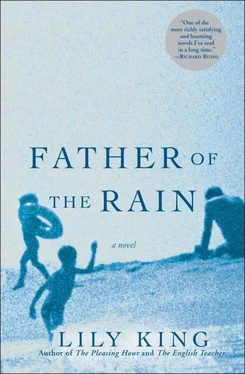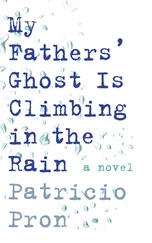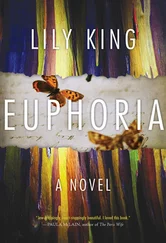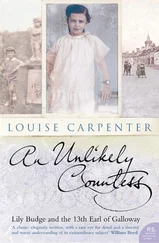If I sleep, my dreams are a continuation of my thoughts and my thoughts are like muscles, flexing and twitching inadvertently and repetitively, squeezing but never quite hard enough. I feel certain, as one does in bed in the dark, that if I can line up the right sequence of thoughts I can solve the problem of my father, the problem of me and my father in the same room. My mind circles. But at some point through the thin lids of my eyes I begin to feel the slightest lifting of the night from the sky, and then I’m liberated from the cell of these useless thoughts, and I see eucalyptus trees, a narrow road, and a yellow door with a pale green window. My heart begins to pound. I’m free again. The little hollow of the driver’s seat is waiting for me. The radio works. Jonathan had it fixed for me last week. I’ll stop at Howard Johnson’s for breakfast. I’ll sit in the booth my mother and I sat in on the way to Lake Chigham. As I pack up my few things and make the bed neat and tight, just as she taught me, I’m aware of how mercurial my emotions are, how last night my mother felt lost to me in a terrifyingly permanent way, and today she feels close by. Death is like that. Death is mercurial, too.
The hallway is dark, the air moist. I smell the cedar balls in the old chest as I pass it. If I go down the front stairs I’ll see my father, who always leaves his door ajar. But the back stairs are a straight shot to the kitchen and out the door. These steps are steep and I take them slowly, the wallpaper with its relief of ivy and berries beneath my fingers as I descend, the worn steps full of old smells, and then the humming refrigerator at the bottom, the little wedge of space between it and the wall I used to fit in neatly, so warm in winter. The big dogs are downstairs for some reason. They leap to their feet when they see me.
“Don’t get up, fellas,” I whisper, giddy. “Please.”
They try to block my path. For the first time since I’ve been here, they seem to think I’m in charge. They seem to think I should be feeding them, and they push their noses into my thighs.
The table is clean, cleared of dishes, the blue cloth still on it with just a few grease spots from the lamb. In his careful, slanted boarding-school script my father has written: The pills should do the trick. Goodbye, Daley .
There are neurologists who postulate that we have not one but as many as eight brains tucked in our heads. At that moment I’m proof of it. Some of my brains are trying to misinterpret his words. Pills for the dogs? Antidepressants he didn’t tell me about? And some of my brains just want me to keep moving. He’s lying, one says. It’s a trick, says another. But one brain knows that my father and Catherine have a medicine cabinet full of painkillers and sleeping pills.
I find him on his bed in his clothes on top of the covers. He’s breathing but I can’t wake him. I’m still not sure it isn’t a trick, but I pick up the phone.
I press 911, then wonder if it’s 411, then wonder which one I actually pressed. But a woman is on the line, asking me what happened and quickly with sirens there are people in the house and a stretcher and my father’s eyes open but he can’t tell them what he took or how much. There’s no trace of anything by his bed and none of the many prescription bottles in his bathroom are completely empty.
They pump his stomach. Seven Bayer aspirin.
A psychologist comes to talk to me in the waiting area. He has the eyebrows of a surprised cartoon character, thick diagonal charcoal smudges.
“He’s very lucky,” he says quietly.
“Don’t I know it. Another twenty and he could have irritated his stomach.”
The man’s eyebrows invert and become quite stern. “This was a serious cry for help, young lady,” he says, though he can’t be more than five years older than me. “People cross a line when they take pills, no matter their efficacy. Your father might very well have believed seven aspirin would do the trick. And the statistics are that he will make another attempt and it will be more dramatic. He will need to be monitored closely.”
“I am leaving for California today. I won’t be monitoring anything.”
“They told me you were his daughter.”
“I am.”
“Your father has attempted suicide.”
“He drinks on a temperate day six or seven strong martinis. In my opinion he has been trying to commit suicide most days for the past thirty or forty years.” I feel so still and cold inside. I feel like I could rip this man’s lungs out if I tried, and you can hear it in my voice. Goddamn my fucking father for doing this now.
He scrawls something at the bottom of the white page on his clipboard and rubs his face.
“I specifically asked if there was alcohol abuse because of the blood tests I saw, and his doctor assured me absolutely not.”
“His doctor is one of his oldest drinking buddies. Not a reliable narrator.”
He nods, makes crosshatches in the top corner of his sheet of paper. “Are you familiar with the term intervention ?”
I laugh. Hard. “Let’s see. His second wife just left him, his son claims never to want to see him alive again, his parents are dead, he has no siblings, and his friends should all be in rehab themselves. That would leave me and him in a room. I’d have a better chance in the Coliseum with a bunch of lions.”
“There’s no one who could support you in this?”
“This is not a man who can change.”
“Anyone can change, given the right tools.”
“I challenge you to this one. You take him on and call me when he’s all fixed.”
“California can wait a week or so. Your father needs you.”
“California cannot wait a week or so. I am a full-time professor and my job starts a week from Wednesday.”
“Where?”
“Berkeley.”
“Nice.” He puts down his pen. He is suddenly seeing me as a compatriot. I am in his league now. And I am a woman, I see him also realize. “What department are you in?”
“Anthropology. I’m going to go in and say goodbye to my father now.”
I move down the hallway, blue under the fluorescent lighting. I feel stiff. You’re worse than your mother, you little bitch . Seven aspirin, for fuck’s sake. He had everyone jumping around for seven aspirin. I hope he’s asleep.
But he is not. He lies there with the sheets tucked up to his chin, his eyes wide and staring at the door before I come through it. I stand several feet from the bed, keep my hands in my pockets.
“I’m not doing so well, elf.” He bunches the sheet up in his fists. His face turns a raw red and he begins to cry. “I’m not doing well at all.”
I really don’t know where he should begin. The man needs so much. I squeeze the car keys in my pocket. I have to go. This is a sick man. This is a sick man whose problems I cannot remedy.
“I’m not doing well at all,” he whimpers again.
“You’re not, Dad. You need help.”
“I do need help.”
“But not my help.”
“Yes, I need your help.”
“No, you need professional help. You’re sick.”
“I’m just… I’m just… I don’t know what I am.” The crying turns to sobs. His chest pumps up and down and his mouth opens crookedly. His teeth are yellow and gray.
“Dad, let’s get you some doctors who can help you.”
“What can doctors do? Perry? Perry can’t help me.”
“Not Perry. You need to go somewhere where people are going to take care of you and help you get better.”
“Where?”
“Some beautiful place. Maybe Colorado or Arizona.”
“No.”
“Maybe nearby. Vermont.”
“You’re talking about that place Buzz Shipley went to.”
Читать дальше












